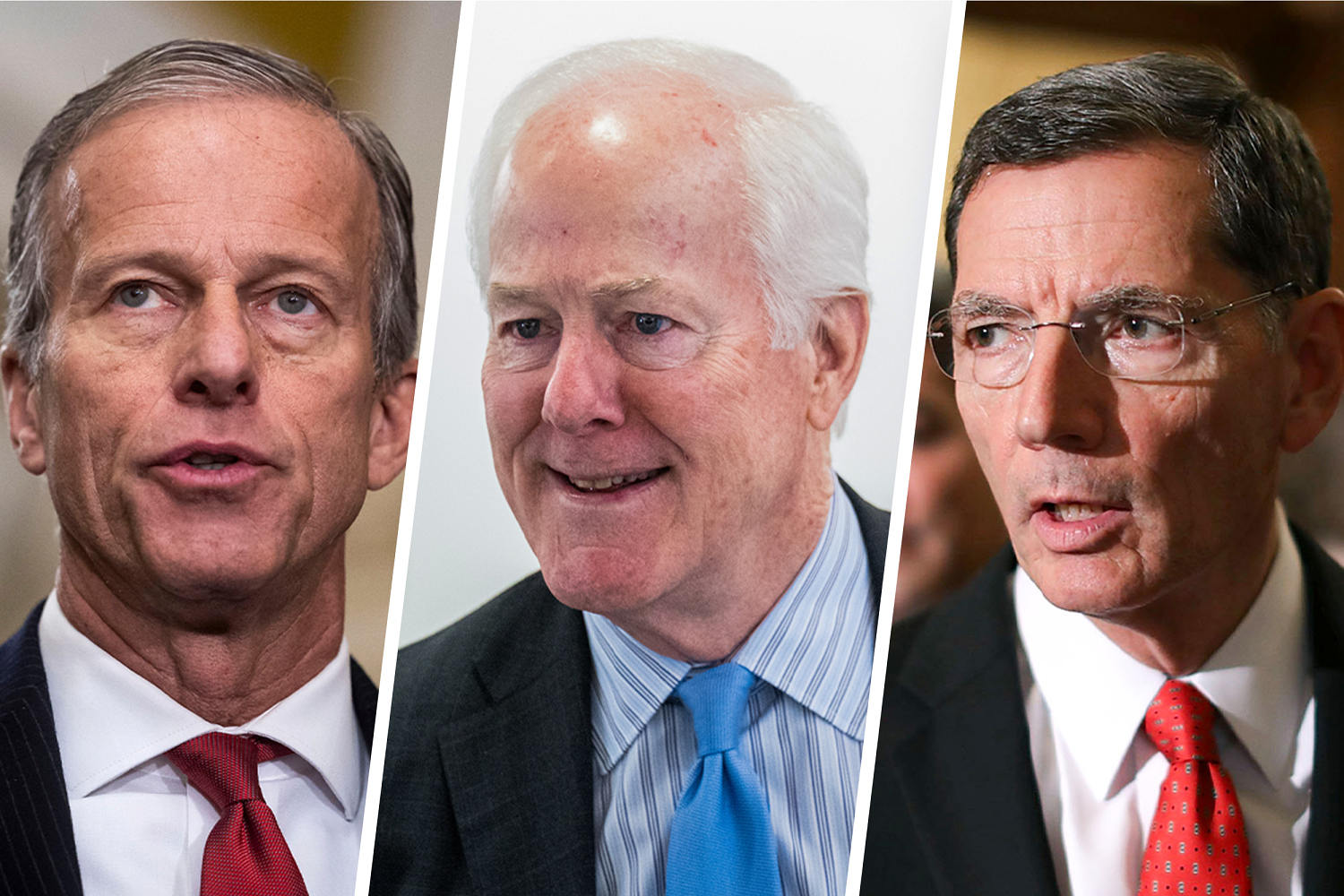[ad_1]

WASHINGTON — The jockeying to replace Sen. Mitch McConnell as Republican leader has begun after the Kentuckian announced he will step down in January following a record 18 years in the position.
The list of prospects begins with “three Johns” — as they’ve become known on Capitol Hill — who are current or former deputies to McConnell and are widely seen as the frontrunners for the post. One thing they have in common: All have endorsed Donald Trump for president as the ex-president’s influence with the Senate GOP grows.
Though Trump could be a factor if he decides to weigh in on the race, Senate Republicans will vote for their next leader behind closed doors in November. McConnell’s successor will take over in January.
Here are the names in the mix for top Republican leader, including the three Johns and some non-Johns who may make a long-shot bid.
John Cornyn
Sen. John Cornyn, R-Texas, became the first Republican to announce his bid Thursday, doing so in a statement. He said he hopes to fix a “broken” Senate.
“I am asking my Republican colleagues to give me the opportunity to succeed Leader McConnell,” Cornyn said. “We will improve communication, increase transparency, and ensure inclusion of every Member’s expertise and opinion. We will restore the important role of Senate committees and reestablish the regular appropriations process, rather than lurch from one crisis to another. And we will return power back to our members; there will be no more backroom deals or forced votes on bills without adequate time for review, debate, and amendment.”
Cornyn, 72 and first elected in 2002, served as McConnell’s whip in the minority and majority from 2013 until 2019 when he was term-limited out of the post. As he said in his statement, he has also spent two terms as chair of the National Republican Senatorial Committee, helping to raise money and elect GOP members to the upper chamber.
Asked how he will navigate the wing of the party that disagrees with his vote for Ukraine and Israel aid, Cornyn said: “The leader is not a dictator — the leader should be more of a facilitator. And if you’re going to be in leadership, you’re going to have to do things — because the membership demands it — that maybe is not what you would do as an individual senator voting on a piece of legislation.”
History with Trump: In Feb. 2021, Cornyn said Trump’s “language was reckless” on Jan. 6, adding: “I think he miscalculated, assuming he calculated at all, about what the impact of a mob would be. Mobs don’t act like rational people.” Cornyn has long questioned Trump’s ability to win a general election in 2024, but he endorsed him on Jan. 23, saying that Republican voters have made up their minds.
John Thune
Sen. John Thune, R-S.D., the current minority whip, makes no bones about the fact that he wants the job. He will be term-limited out of the whip job after this year, which means anything other than the No. 1 position would be a step down for him.
“I think it’s probably one of the worst kept secrets in Washington,” Thune, 63 and first elected in 2004, told reporters on Thursday. “We’re having all the conversations with our colleagues and we’ll continue to do that — and talk about the future of the Senate and what our members want in the next Senate Republican leader.”
A spokesperson for Thune added: “He looks forward to having substantive conversations over the next few days and weeks about the future, but he intends on keeping those conversations private.”
Bottom line: Thune is running, just not formally yet.
History with Trump: Thune voted to acquit Trump in the Senate impeachment trial but said it “should not be viewed as exoneration for his conduct on January 6 … or in the days and weeks leading up to it. What former President Trump did to undermine faith in our election system and disrupt the peaceful transfer of power is inexcusable.” Thune initially endorsed Sen. Tim Scott, R-S.C., in the 2024 race. On Feb. 25, Thune endorsed Trump. Asked about his prior criticism of the ex-president, Thune said “the voters have spoken” and it’s now a “binary choice”: Trump or Joe Biden.
John Barrasso
Sen. John Barrasso, R-Wyo., who has held the No. 3 GOP post since 2019, was not in Washington on Thursday, instead making a trip to Arizona to campaign for far-right election denier Kari Lake, the likely Republican nominee for Senate, according to his office.
Barrasso, 71, was first elected in 2007. He could conceivably run for the No. 1 or No. 2 position — either would be a step up from his current job. “He’s in a position of strength and will make an announcement on his own timeline — not somebody else’s,” a source close to Barrasso said.
Barrasso’s home state colleague, Sen. Cynthia Lummis, R-Wyo., said Thursday he “has not indicated to” her whether he will run for leader but that he can count on her support if he does. “Whatever he decides to do, I will be supporting him,” Lummis said.
On Wednesday, Barrasso said, “My number one focus is the election in November for President and for majority control in the Senate as well as majority control in the House of Representatives.”
History with Trump: Barrasso was the first of the three Johns to endorse Trump for president, doing so on Jan. 9. In late 2021, Barrasso had no criticism of Trump when asked on ABC News about the former president defending Jan. 6 rioters’ chants of “hang Mike Pence.” Barrasso was also the only member of GOP leadership to vote against the recent aid bill for Ukraine, Israel and Taiwan.
Steve Daines
Sen. Steve Daines, R-Mont., the current chair of the National Republican Senatorial Committee, was coy when asked Thursday whether he’d be interested in running for GOP leader.
“There’ll be no Majority Leader without a majority. I’m focused on getting the majority,” Daines said.
When pressed about the fact that he wasn’t ruling out a run for leader, Daines responded, “We’re focused on getting the majority back.”
Daines, 61, is a newer member of GOP leadership, joining the Senate in 2015, but has quickly ascended the ranks, and is navigating the NRSC chairmanship with a favorable map for Republicans.
History with Trump: Daines was the first member of GOP leadership to endorse Trump, doing so in April of last year. He also rejected the idea that Pence could have overturned the election on Jan. 6, saying after he voted to acquit former President Trump, “Vice President Pence faithfully upheld his oath of office and certified the election. I voted to acquit President Trump of a second impeachment because I believe the trial was unconstitutional.”
Rick Scott
Sen. Rick Scott, R-Fla., who ran against McConnell in the last leadership election, is part of a group of conservatives calling for a special conference meeting to discuss the path forward. He’s a vocal critic of McConnell, and he’s more controversial within the caucus than other prospects. If he runs again, he’d be an underdog, at best.
“When I ran before, I thought we needed a change in leadership, so I’m looking forward to a change in how we operate,” Scott said on Thursday. He has called McConnell’s exit “an opportunity to refocus our efforts on solving the significant challenges facing our country and actually reflect the aspirations of voters.”
Scott, first elected in 2018, failed to unseat McConnell in the leadership elections in Nov. 2022, getting 10 votes compared to 37 for McConnell. Scott was the NRSC chairman during the 2022 cycle, when Republicans had high hopes of winning back the majority but fell short. Some blamed Scott for that failure; he blamed GOP leaders for failing to inspire conservative voters.
“I believe it’s time for the Senate Republican Conference to be far more bold and resolute than we have been in the past,” Scott said in a letter asking for members’ votes during his failed bid “We must start saying what we are for, not just what we are against.”
History with Trump: Scott endorsed Trump in Nov. 2023. He was one of the first governors to endorse Trump in 2016 as well.
[ad_2]
Source link



